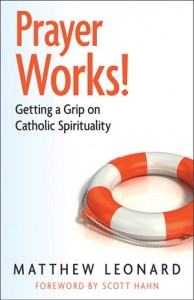 A well-timed one-liner allows for a lighthearted look at ourselves and the world. It affords an opportunity to appreciate amazing ironies in our life. It encourages us to start talking with others. When delivered well, an amusing line elevates language to the level of art and leaves us laughing, wanting more.
A well-timed one-liner allows for a lighthearted look at ourselves and the world. It affords an opportunity to appreciate amazing ironies in our life. It encourages us to start talking with others. When delivered well, an amusing line elevates language to the level of art and leaves us laughing, wanting more.
In Prayer Works! Getting a Grip on Catholic Spirituality (Our Sunday Visitor), Matthew Leonard teaches timeless truths about prayer – how it invites sacredness in silence, provides authentic meaning to meditation, conforms us to Christ through contemplation, as well as asks for a total trust that believes the Lord truly has our best interests at heart. Leonard’s lessons work well, however, because they reflect quick personal wit meeting deep theological wisdom. For fathers, his humor assists us in appreciating and accepting God’s timetable of response.
Schedule of Joy
In an era of instantaneous information and live video streaming, we tend to get what we want immediately, when and how we want it. Leonard jokes with readers, however, that God is “never late” but “seldom early” when it comes to a faith that “frequently tests us” and “often requires patience” (page 56). He discusses how prayer illustrates God working on a longer schedule with a larger purpose and perspective.
Prayer serves as a form of communication that proposes the gift of an everlasting relationship with God. It exposes our plans and planning today – at times frustratingly so – to the joy of heaven, the true happiness to be found tomorrow and for all eternity as long as we just surrender what we want to what we need.
Youth Deliveries
We interpret a lot about the world by the experiences of our younger years. What we liked and didn’t like forms an early framework that focuses our eyes, attunes our ears and even inspires the words that come out of our adult mouths. Leonard observes how children lead us to lessons on prayer.
He admits that he found “merits” in his 2-year-old daughter misstating the conclusion to Our Father as “deliver us from Nemo,” and years later, his 3-year-old son closing with “deliver us from people” (69-70). He illustrates how prayer appreciates our awkwardness. It can express our imperfections with a child-like perspective that points us toward the perfection of Our Father.
Trust Navigation
Toward the end of the book Leonard expresses how challenging it is today “to find people whom you can implicitly trust, people who share the same faith and follow the same moral compass.” He quips that “the arrow should always point up” (145).
Trust seeks security as one of its objectives. It takes a stand on steadfast principles that aren’t always standing on the side of popularity. In doing so, trust can also surprisingly bring together people with whom we’d never expect to share the same side. Faith adds that mutual trust includes searching for the sanctuary of heaven in solidarity. Leonard reveals how prayer produces terrain for that navigation, common ground for a generation to navigate their most cherished gifts – children, the next generation – toward a life that values faith, family and freedom.
At just 160 pages, Prayer Works! proves brief, basic in language and a practical primer on the timeless topic of prayer. Leonard gives dads in the days ahead much to share inside and outside their families. He also leaves us laughing with the Lord, wanting more of what prayer has to offer.



